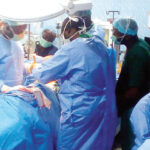Cigarette Smoking Linked to Early Menopause in Women, UNIJOS Study Finds

Recent research has shed light on a previously underexplored facet of menopause – cigarette smoking. According to Professor Amaka Ocheke, an expert in Obstetrics and Gynaecology at the University of Jos, cigarette smoking appears to be a contributing factor in women reaching menopause as early as 45 years of age.
Intriguingly, this study challenges the widely held assumption that infertility is solely attributed to one gender. Professor Ocheke emphasizes that both men and women play a role in the issue of infertility within couples.
“In the realm of infertility, which affects around 10-15 percent of couples worldwide, Nigeria sees a higher prevalence of 20-30 percent. Interestingly, approximately 30 percent of infertility cases stem from female factors, another 30 percent from male factors, and an additional 30 percent from combined male and female factors. In about 10 percent of cases, a discernible cause cannot be identified,” detailed the UNIJOS expert.
Delving into pregnancy dynamics, Professor Ocheke highlighted a fascinating ethnic disparity. The Yoruba ethnic group exhibits the highest occurrence of twin pregnancies, which is the most prevalent form of multiple pregnancies, particularly among individuals of African descent. Regrettably, not all pregnancies reach full term, as Professor Ocheke pointed out that “miscarriages” affect 10-20 percent of pregnancies in Nigeria.
Elaborating on the phenomenon, she explained that a “miscarriage” or spontaneous abortion refers to a pregnancy ending before the 28-week mark. This disheartening occurrence is distressingly common, impacting 10-20 percent of all pregnancies in the country.
These profound insights were conveyed during Professor Ocheke’s 106th inaugural lecture at the University of Jos. Aptly titled “The Odyssey of the Nigerian Uterus: Bumps, Potholes, and Accidents,” the lecture illuminated the intricate journey of women’s reproductive health in Nigeria. As this research offers new perspectives on menopause and infertility dynamics, it contributes to the broader discourse surrounding women’s health in the nation.



